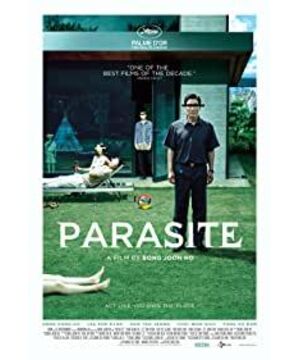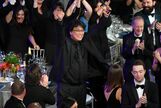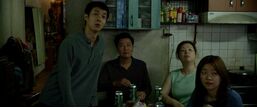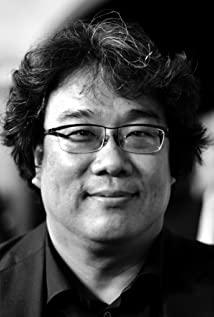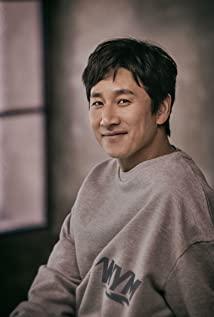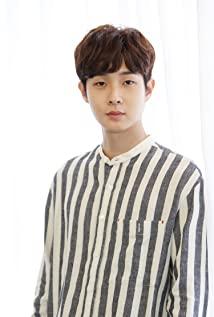In the second half of "Parasite", when the Kim family escaped from President Park’s residence on a rainy night, we can see an extreme, vertical angle of view. This way of presentation is almost in the style of Imamura Shohei. Here, when the slums are presented as sewer trenches, we are faced with a question: If President Park's decent life is still called "people", then what is the group that ran away in a hurry? In other words, when are they determinated from the concept of "person"?
The next day, President Park decided to hold a pop-up party at home. The eldest daughter Dahye hopes to call her secretly crushed teacher Kevin. This is a typical drama moment, indicating the final "showdown" and the last one of psychoanalysis. Stage: By "face-to-face" the early trauma and cancel it as a mere event. However, as people expected, the trauma really came...
Therefore, if we want to know as much as possible about "Parasite" and the class psychology portrayed by Feng Junhao, we must be like teacher Jessica in the film, and respond to our own questions through some random reading psychoanalysis primers. Right now, we encountered the first metaphor set up by Feng Junhao: psychoanalysis.
One: Indian as a metaphor
"Parasite" is a suspense film, and its biggest suspense lies in: what has happened in this building, and what content does it have that transcends daily and existing cognition?
And Duosong is the entrance to understanding everything. He is the youngest child in the family, and he is also the unrepressed, or the least repressed existence, or the “early” state of the family.
But he can't say that he is restrained by limited cognition, but in any case, we must start with the state he presents. When Jessica first saw the black area in the lower right corner of the painting by Duo Song, she told the hostess Mrs. Park : "Are you willing to open up the crux of his heart with me?"
This kind of request is dangerous, even savage, which means "Can I understand yourself better than you, and then subvert you?" The opening of the crux means that it is suppressed, and the retouched reality cannot be reduced. An intrusion into the symbolic order led to the disintegration of the existing order. Every middle-class/rich man’s mansion will have a secret passage, or a closed attic. The geographical concealment proves that there is an oppressed fact hidden in it. Or the secret desire, the narrow road leading to the secret path symbolizes the female body, entering the tunnel means entering the desire itself, or to another path—the mother body, and childhood.
Any patient who knows something about psychoanalysis will instinctively reject this treatment or give birth to a large number of defense mechanisms. When Mrs. Park agreed to Jessica’s request to “continue the treatment”, she would definitely not be out of spirit. The ignorance of analysis is an intermediate state of irony, which sounds like a request for sexual pleasure from Shake M to Shake S: "Yes, I want...but don't really..." The sentence is explicit, and the second half is a metaphor. This is the subtext of the abuser/battered party, and it is also the subtext of Mrs. Park, because on the day of Duo Song’s birthday, which is the same as when he witnessed the "ghost" and fainted in his early years On the same day, the Park family decided to go out camping to celebrate her birthday instead of looking for the disease with Jessica. The reason she agreed with Jessica’s request was actually a law from the superego, which required her to act like a mother. , And knows everything about his son's condition.
But psychoanalysis is still necessary and will inevitably happen. One day, heavy rain will come "on time" on Duo Song's birthday.
Regarding Duosong, the second key point lies in the "Indian" game he enjoys, which is the second metaphor of the film. Many fans will think of the children in Kurosawa Akira's "Heaven and Hell" similar to "Cowboys and Indians". "The game, there are many critics familiar with post-colonialism who attribute it to a phenomenon of globalization and the post-colonial fable of the cult of the first country by the Korean elite. But through psychoanalysis and the rhizome-like connection of arbitrary symbols such as film genre and history of ideas, we will discover more other content.
"Western films" originated from the legendary story of the western development history, as well as a kind of affirmation and desire for absolute, good and evil morals. As Bazin said, "the deep reality of western films is a myth." Bazin not only implied Western films carry the writing of the collective unconscious, but also present a possibility. Not only is it dissociated from a specific era and geographical landscape, we don’t need stagecoach and Monument Valley, but only need to be colonized and colonized, and jurisdiction. The symbolic context of positionalization.
Similarly, the "Indian" as one of the important elements of western films is also separated from the specific national/cultural concept. This concept revolves around a Western, subjective construction. The existence of Indians often means that in the plain space. Black hole. As a kind of alienated and intrusive existence, they usually appear on stagecoach trips in weird forms, reminding that this place is no longer a European, known space.
Of course, we can regard "Parasite" as a western film, a western film constructed in contemporary society and in a closed space. However, this western model is by no means an Indian who attacked a stagecoach, but an intrusion. The red fan avengers in the small town, the synonym for "parasitic" is "colonization". The Kim family is quietly colonizing, replacing President Park’s servants with his own. This reminds us of the American War of Independence and The history of western development; when they went out to celebrate the birthday of Pu’s family, they turned their backs on the guest and made the space jurisdiction. Then, the real "intruder" Indians appeared. The "indigenous people" here are the secret rooms Ghosts in.
So why does Duosong continue to enjoy the concept of "Indian"? We can see the relationship between colonization/colonization and intrusion/intrusion hidden in this concept. In other words, these contents, as the content of fear in the true sense of Dasong, become " "Indian", the more he manifests this signifier, then it will prove that everything must return to the original trauma.
Two: Occupied House
"Parasite" is destined to accept criticism from the audience. One of the questions is: Why are the characters of the rich so flat and so ridiculous? However, because of this, we can pay attention to the dramatic tension that occurs between the lower classes, rather than the Marxian class relationship. Feng Junhao acknowledged the objective existence of social injustice, but he tore up the falsehood of the so-called "class". community.
In other words, as the former maid in the film implied when it broke in for the first time on a rainy night (or we can change a word: return), at this time, the Park family is outside celebrating Duosong's birthday. Their spatiality at this time Absence implies their structural absence in the entire film "Parasite". They are essentially sacrifices: in the chaotic carnival at the last minute, as sacrifices to the massacre and slaughter.
So, what role does the absent rich man play in "Parasite"? Here, the third metaphor of the film appears: space. Just like other space art, the design of architectural space is actually the projection of class consciousness and its hidden unconsciousness. The "high and low" between the rich and the poor implies a certain unequal relationship, and the similarities are closed and open. , The amount of idle space.
Space is a shaped projectile. Similarly, this projectile will reshape people. When the Jin family, a lower class in society, settled in this modernist building, Kevin lay on the grass and read Dahui, the eldest daughter of the Park family. In his diary, and imagined that he would propose to him in the future and get rid of the poverty of the family. When Jessica took a bath in the big bathtub like the hostess, there seemed to be a kind of Deja Vu, just as they had enjoyed such a life; they Already shaped by space, it has become the object of space production. The dramatic structure adopted in "Parasite" is the ultimate respect for space. In the film, only space is the only living existence, and people are more like one. A machine, an occupied thing, we can say: It is the occupied house that is leading the "Parasite", it is the ghost that permeates the space.
Three: Technology, and cyberpunk in "Parasite"
Back to the beginning of the film, Kevin was searching for Wifi signals in the cramped basement. In another scene, when the former maid who "broke in" threatened the family, what she was holding was not a weapon, but a mobile phone, "Don't Otherwise, I’ll send this video to President Park.” The sending of the video means that the family’s scam has been exposed. This is a kind of super-real, or symbolic trauma, and the threat it brings. Sex is far more than pain in the real sense.
Therefore, we cannot ignore that "Parasite" is full of metaphors about technology, that is, this is a "cyberpunk" film constructed in the current Korean society. Under the high-tech society, it is an extreme social problem. Intensified, some people began to return to primitive and animalistic. The arrival of information technology seems to have created an intersection between the various classes of society. Children from the lower and lower classes have acquired a signifier of the upper class, Kevin, and logically enter the room. In this context, dialogue seems to be possible, but In fact, all it brings is the further tearing of the social class. Equality is just an imagination, because we are increasingly being deprived of the expression of inequality by a stitching, all of which are just like on the screen of a mobile phone. The beauty camera, the picture quality has been enhanced, and the speed has been changed. A "net celebrity video" was born, or it was transformed into a perfect society in the medium, even if the truth is that one weak in the slum splashed on the other weak. water.
At the end of the film, Kevin (at this time the signifier no longer plays a role, he becomes the son of the lower class, Kim Ki Woo) the only way for his father to escape the basement is to conform to this order as much as possible. A certain scene shows This kind of imagination, but in fact, after returning to "reality" at the end, proves that this kind of imagination is impossible. Being the "last man" of the upper class is the only way to resist. Here, pre-narration is no longer a decision. Theory, but to present an absolutely impossible image, which neither belongs to the “real” record, nor does it exist in the real field of the movie. This is undoubtedly a kind of ultra-real, Internet logic, as a This kind of electronically generated virtual real image is also the driving force of the consumer society, or the ultimate reason why we succumb to the law of the big Other and the illusion of "freedom", when Foucault's discipline and punishment society Gradually withdraw, what we will usher in is a technology-oriented psychopolitics.
Perhaps what we need most is the recall of the "Indian" metaphor, even if the recall is gameplay, and where are the Indians? Maybe their terrifying body will appear in some electronic display screen.
references:
Sigmund Freud: "Introduction to Psychoanalysis", translated by Gao Juefu, The Commercial Press
Sigmund Freud: "Analysis of Dreams", translated by Fang Housheng, Zhejiang Literature and Art Publishing House
Carl Jung: "Psychoanalysis and Soul Healing", translated by Feng Chuan, Yilin Publishing House
Slavoj Zizek: "Enjoying Your Symptoms-Lacan Inside and Outside Hollywood", translated by Wei Guangji, Nanjing University Press
Slavore Zizek: "Looking Obliquely", translated by Ji Guangmao, Zhejiang University Press
Jean Baudrillard: "Consumer Society", translated by Zhang Xinmu, Nanjing University Press
Han Bingzhe: "Spiritual Politics", translated by Guan Yuhong, CITIC Press
Andre Bazin: "What is a movie?" ", translated by Cui Junyan, The Commercial Press
View more about Parasite reviews


